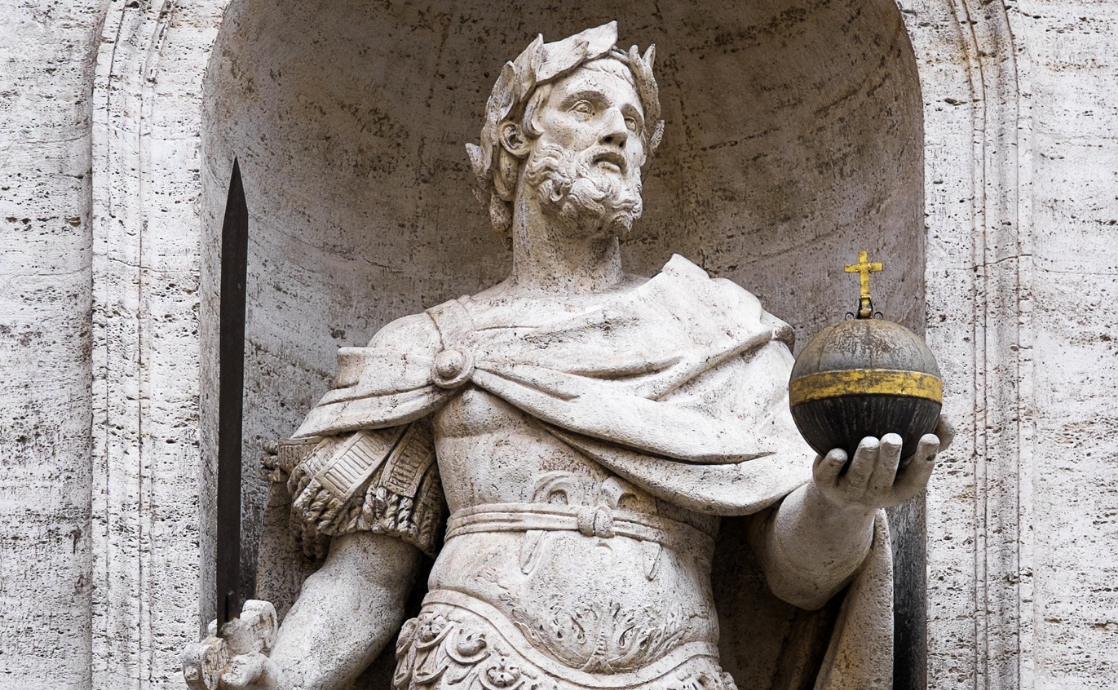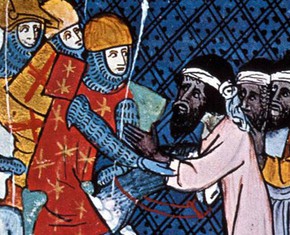The views expressed in our content reflect individual perspectives and do not represent the authoritative views of the Baha'i Faith.
Let’s consider the life of one of Christianity’s greatest heroes: King Charlemagne. What actions have made him such a hero to Christians, and why? Do the historical facts support his exalted status?
Certainly, history has had its share of great monarchs, kings and queens who ruled their lands and their subjects fairly, peacefully, and benevolently. The Baha’i teachings praise and exalt such rulers, who deal equitably with their people. In a tablet he wrote to the world’s political and religious leaders, Baha’u’llah, the prophet and founder of the Baha’i Faith, included his basic admonitions for the rulers of earthly governments:
O ye rulers of the earth! Wherefore have ye clouded the radiance of the Sun, and caused it to cease from shining? Hearken unto the counsel given you by the Pen of the Most High, that haply both ye and the poor may attain unto tranquillity and peace. We beseech God to assist the kings of the earth to establish peace on earth. He, verily, doth what He willeth.
O kings of the earth! We see you increasing every year your expenditures, and laying the burden thereof on your subjects. This, verily, is wholly and grossly unjust. Fear the sighs and tears of this Wronged One, and lay not excessive burdens on your peoples. Do not rob them to rear palaces for yourselves; nay rather choose for them that which ye choose for yourselves. Thus We unfold to your eyes that which profiteth you, if ye but perceive.
RELATED: When Constantine Converted to Christianity
This lofty Baha’i standard – which requires the heads of governments to first deliver peace, justice, and economic security to their peoples – can help us understand how some rulers have fared when evaluated using Baha’u’llah’s basic measure of effectiveness for leaders of nations.
As a young boy growing up Christian, I was taught that Charlemagne – whose name simply means “Charles the Great” – was a great Christian king, indeed the very model of Christian kingship, and after hearing those stories I was very much attracted to his magisterial presence and his defense of Christianity. He managed to unite much of Europe under the banner of the Catholic Church, I was taught, and some even believe his actions resulted in Christianity becoming the dominant religion in the Western world.
As a youth I was not, however, told how he came to rule and how he ruled.
Like Constantine, Charlemagne was the son of a ruler and was reared on war. His father was King Pepin the Short and his grandfather was Charles Martel, who defeated the Muslims at Poitiers in Central France in what is often called the Battle of Tours.
Charles’ father had a political relationship with the Pope. The Pope, Stephen II, had given Pepin, who was then Mayor of the Palace of Austrasia (the province that today consists of northeastern France, Belgium, and parts of western and central Germany) permission to overthrow his king, because Pepin thought him ineffectual. When permission was granted and the overthrow was accomplished, Pepin assumed the kingship – thus, Pepin owed the legitimacy of his new kingship to the Pope, and the Pope would soon collect on the favor.
At that time Rome feared the approach of the advancing Lombards, an Arian Christian tribe who believed that only God was without beginning and that the son, Jesus, was created. This understanding hinges, of course, on what you mean by Jesus and how you understand divine foreknowledge. From the Baha’i point of view, Jesus reflected the eternal light of God and his appearance was ever-coming in the knowledge of God, and thus eternal. The pope requested Pepin’s help in defending Rome and the Church against the Lombards and Pepin obliged, driving the Lombards away from Rome.
As it turned out, much of the history of the Frankish kingdom under Pepin and his son Charlemagne would involve these kinds of bloody wars between different Christian kingdoms – hardly a model for Christian civilization building.
When Pepin died in 768 C.E., Charlemagne took over the whole of the Frankish realm – everything from just beyond the east bank of the Rhine to the Atlantic, comprising the entire Western half of modern Germany, the Netherlands, Belgium, France and Luxemburg. At the same time Charlemagne broke off peace offerings with the Lombards, returning to their king his daughter to whom Charles was married, and marrying instead a thirteen-year old girl named Hildegard. Charlemagne did what had long been done through royal marriage: build peaceful alliances.
The pattern of Frankish defense of the Papacy soon repeated itself. The Lombards once again threatened Rome, and so the new Pope, Adrian I, pleaded with Charlemagne for relief. He agreed, beat back the Lombards and then had himself crowned King of the Lombards in 774. Sometime later, another Pope, Leo III, appealed to Charlemagne again for protection – this time from the Romans. Charlemagne again complied and as an apparently unexpected reward, Pope Leo crowned Charles the Holy Roman Emperor on Christmas Day in the year 800.
For many at the time, this signaled that Christ’s kingdom was now clearly established on Earth – but the kingdom established did not mirror the attributes we expect of God’s kingdom.
Somewhere in me it is likely that I have a bit of Saxon blood. Charlemagne was the bane of Saxons, who occupied most of the land from the Rhine to the Elbe. At that time, the Saxons worshiped gods like Tiw (god of war), Woden (chief god), Thor (god of thunder), and Frig (goddess of love and wife of Woden), from whom we get the names of the days of the week: Tuesday, Wednesday, Thursday and Friday. They may have learned their religious beliefs from the Vikings, who venerated the same gods.
Once again, Charlemagne went to war. Like most military conquerors he wanted more land, and more subjects to rule and tax. In a talk he gave in Paris early in the 20th century, Abdu’l-Baha, the son and successor of Baha’u’llah, had this to say about the use of such aggressive force:
We must hope, we must not despair. We must look forward to the time when war and dissension will disappear, when love and unity will reign, and the light of God will shine upon all banners and into all hearts, and unite them to one another and to Him.
The earth is God’s.
There has been another battle today and much blood has been shed. The poor have given their lives as a sacrifice to the greed of others. Men are fighting for the earth – for land – and it belongs to no one but God. Kings have fought for it from Charlemagne to Napoleon I, yet they had no right to it. One fought wrongfully to wrest it from another who wrongfully possessed it. All people are merely tenants of God upon the land, yet nevertheless empires have disappeared in the struggle for its possession, and again men are shedding blood for the ownership of mere land.
While man might become a centre for good, for amity, he fights like ferocious beasts for the right to land.
God wishes man to establish just equality, not to transgress laws, to help one another and live together in love. Do what God asks, be the cause of unity and peace – wipe out the horrors of war and hatred!
Charlemagne decided that it was his sacred duty to convert the pesky Saxons by force. The Saxons held onto their ways through a score of battles and thirty years of war, but in the end, they were overwhelmed and were forcibly converted to Christianity by Charlemagne, under penalty of death.
RELATED: Religious Wars: Who Bears Responsibility?
What conversion meant is revealed in Charlemagne’s Saxon Capitulary of 781, which prescribed 34 religious practices for the Saxons as well as the associated punishments if the ordinances were not obeyed. Capital offenses included “unfaithfulness to the king,” eating meat during Lent, or remaining unbaptized. This forced conversion and forced indoctrination required mandatory contributions to religion, and great restrictions on personal freedoms.
Charlemagne went on to forcibly convert and subjugate other groups including the neighboring Slavs (to the East of Saxony) and Avars (in what is now Hungary). My struggles with Charlemagne are not with his war-like majesty, nor with his conviction or his protection of various Popes, nor even with his subjugation of pagans – though as a Saxon I doubt I would have liked being subjugated.
I struggle because, in the end, his rule was not the promised rule. It was not about justice, peace, and divine civilization building; it was about subjugation to the authority of a king, who in many ways was not so very Christian. Though he politically strengthened the rule of Christianity, he did not bring the kingdom of God to Earth. His rule perpetuated war and subjugation. It constricted thought, activated persecutions, endorsed slavery, and failed in the end to curb corruption – especially within the church.
















Comments
Sign in or create an account
Continue with Googleor